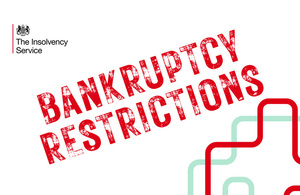What Is a Bankruptcy Restrictions Order (BRO)?

When you declare bankruptcy, you enter a 12-month period as an “active bankrupt,” during which you must adhere to a set of restrictions. If you fail to comply with these restrictions, you may face a Bankruptcy Restrictions Order (BRO).
A BRO is a court-issued order that can extend these restrictions beyond the typical 12 months for a period of 2 to 15 years, depending on the severity of your actions. It also imposes additional restrictions, which can make navigating bankruptcy even more challenging.
In this guide, we’ll walk you through the process of a BRO, the restrictions, and the consequences of violating them.
What Is the Process of a Bankruptcy Restrictions Order?
Step 1: The Official Receiver Applies to the Court
If the Official Receiver believes you’ve breached your bankruptcy rules, acted irresponsibly, or been dishonest, they may apply to the court for a BRO. You’ll receive a letter explaining the application unless your bankruptcy is due to end within 6 weeks.
Step 2: You Respond to the Application
Once notified, you have 21 days to either accept or challenge the allegations. If you accept, you may enter a Bankruptcy Restrictions Undertaking (BRU), which has the same restrictions as a BRO but typically for a shorter period due to your admission of responsibility. If you challenge the allegations, a court hearing will be scheduled.
Step 3: Court Hearing
At the hearing, you’ll be given another 14 days to either accept or contest the allegations. Failing to respond limits your participation in the process unless explicitly allowed by the court.
Step 4: Submission of Evidence
If you contest the allegations, you have 28 days to submit evidence to the court and to the Official Receiver. The Receiver can also present counter-evidence. You can still opt for a BRU before the hearing if you believe your case is weak.
Step 5: Court Decision
After reviewing the evidence, the court will decide whether you violated your bankruptcy restrictions and will issue a verdict. The length and severity of the Bankruptcy Restrictions Order will depend on the seriousness of the breach.
What Are the Restrictions of Bankruptcy?
To avoid being charged with a BRO, you must not breach any of the standard bankruptcy restrictions, which include:
- Borrowing over £500 without informing the lender of your bankruptcy status
- Acting as a company director
- Engaging in the creation, management, or promotion of a company
These restrictions are designed to ensure you don’t take on further debt or manage businesses irresponsibly while dealing with bankruptcy.
What Can Trigger a BRO?
There are several actions that could result in a Bankruptcy Restrictions Order beyond violating bankruptcy restrictions. These include:
- Borrowing money that you know you cannot repay
- Failing to cooperate with the Official Receiver
- Allowing debts to escalate through negligence
- Hiding or undervaluing assets
- Preferentially paying off certain creditors (especially if you have personal guarantees)
- Repeated bankruptcies
In short, any dishonest or grossly irresponsible financial behaviour can lead to a BRO.
What Happens After a BRO Is Issued?
Once a BRO is issued, the Official Receiver will notify your creditors and publish the BRO on the publicly accessible Individual Insolvency Register. This could potentially lead to more complaints being filed against you. Your bankruptcy period will also be extended, meaning the restrictions will last longer, typically for an additional 2 to 15 years.
What Additional Restrictions Does a BRO Impose?
A BRO doesn’t just extend your bankruptcy restrictions—it also imposes several additional ones. These can include prohibitions such as:
- Working on education or healthcare committees
- Holding public office
- Serving as a trustee for a pension scheme or charity
These restrictions are designed to protect the public by preventing you from taking on roles of responsibility.
What Are the Consequences of Breaking a BRO?
Unlike standard bankruptcy restrictions, violating a BRO is a criminal offence. If you break these rules, the consequences can be severe. You may face:
- Extension of your restriction period
- Large fines
- Imprisonment in extreme cases
It’s crucial to follow the rules of your Bankruptcy Restrictions Order carefully to avoid further legal and financial repercussions.
If you’re facing a BRO or have concerns about your bankruptcy process, don’t hesitate to speak with an expert today at info@i10.303.myftpupload.com to get the guidance you need.
The Grim Truth for Loan Note Holders -79th Luxury Living Six Ltd (LL6)
No assets or safeguards. No clear path to recovery. If you’re one of the many investors who entrusted your money to The 79th Group’s loan…
Read MoreOverdrawn Directors’ Loan Accounts: How to Avoid Trouble
Many company directors borrow money from their businesses through what’s known as a director’s loan account (DLA). In principle, there’s nothing wrong with this, so…
Read MoreDebt Assignment Explained: A Strategic Tool for Creditors
In today’s volatile commercial landscape, unpaid debts can severely undermine cash flow, disrupt operations, and threaten the survival of a business. For creditors facing non-performing…
Read MoreThe 79th Group Administration: What It Means for Loan Note Holders
As The 79th Group enters administration, many loan note holders are left uncertain about what this means for their investment. What happens to the money?…
Read More



